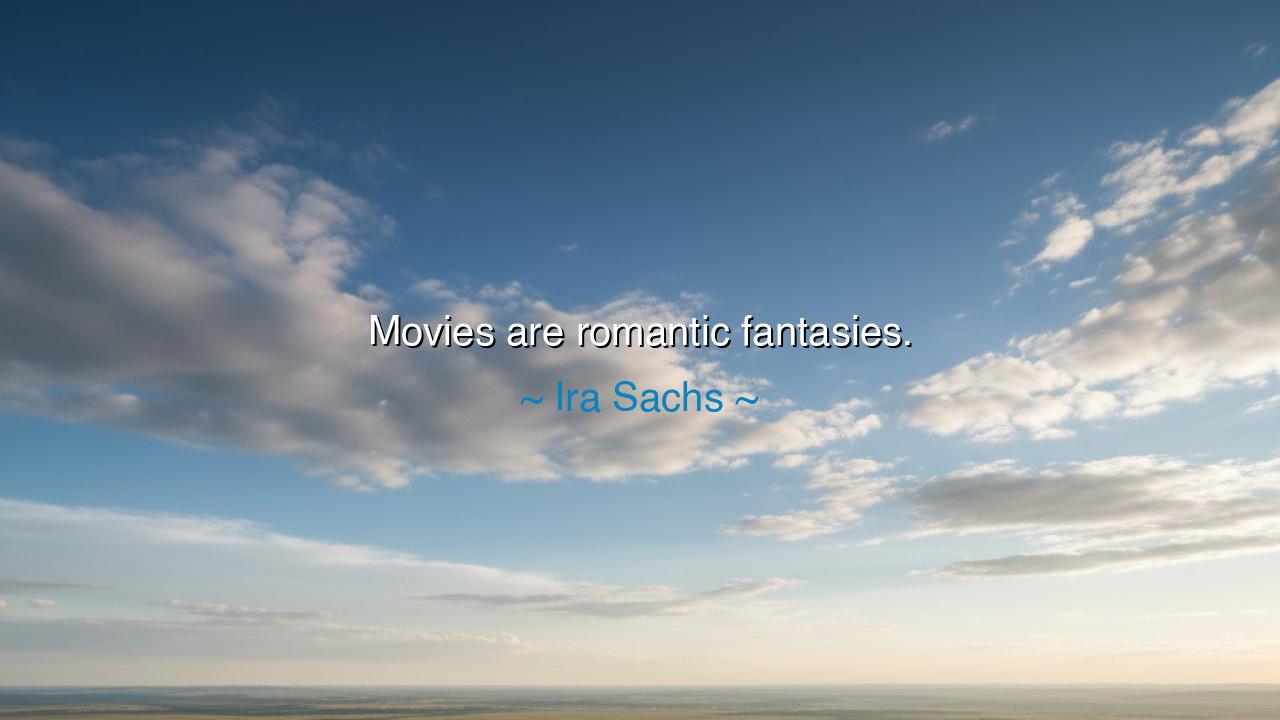
Movies are romantic fantasies.






The words of Ira Sachs—“Movies are romantic fantasies”—resound like a quiet revelation, yet within their simplicity lies a profound truth about the nature of art and the human spirit. For cinema, though born of flickering light and shadow, is nothing less than the projection of our desires, our dreams, and our longings onto a screen vast enough to contain them. Movies do not merely reflect reality; they reshape it, lifting it into the realm of the romantic, where possibility gleams brighter than circumstance, and where the heart dares to believe in what it might never find in the ordinary world.
The origin of this insight reaches back to the earliest storytellers. Before the age of film, the bards and poets of old created worlds in which heroes rose beyond the grasp of fate and lovers defied the boundaries of time and death. Homer’s Odysseus, Dante’s Beatrice, Shakespeare’s star-crossed souls—these were but earlier projections of the same longing: the human will to fantasize, to make reality more tender, more noble, more filled with wonder. In calling movies “romantic fantasies,” Sachs places modern cinema within this timeless lineage of art that seeks not to show life as it is, but as the heart yearns for it to be.
Consider the tale of King Arthur and the mythic Camelot, a story retold across centuries. Historians will tell us that Arthur’s court, if it ever existed, was far less golden than legend declares. Yet the legend endured precisely because it was a fantasy of nobility, of love, of unity greater than the fractured kingdoms of its time. In the same way, when we watch a film, we do not demand historical or practical truth; we long for the vision that the story awakens. Whether it is the shimmering promise of eternal love or the courage of one soul to defy despair, the fantasy nourishes us more deeply than mere fact.
Sachs’s words also remind us that to dream is not folly, but necessity. The world can be harsh, mundane, even cruel, but movies grant us a window into hope. They are not lies, but symbols—teaching us, inspiring us, whispering that within the boundaries of reality there yet lies the spark of something greater. Just as a romantic fantasy on screen can awaken love in a weary heart, so too can it inspire us to act with greater tenderness and courage in our own lives.
The lesson is this: do not despise the fantasies you carry within you. They are not weakness, but fuel. To sit in the darkened theater and lose oneself in a story of love, sacrifice, or triumph is to remember what it means to be human. Our fantasies may never come to us exactly as the screen depicts, but they awaken in us the courage to seek them in our own way. They train the heart to recognize beauty, to endure struggle, and to believe in connection even when the world seems to deny it.
Practically, this means we should allow ourselves to be moved by art. Do not watch a movie only with cold analysis, but let it stir your soul. Afterward, ask yourself: what in this fantasy calls to me? Is it the devotion of lovers, the loyalty of friends, the hero’s persistence? Then, take that longing and bring it into your daily life in small but concrete ways—through kindness, through persistence, through love freely given. In this way, the romantic fantasy ceases to be only an escape, and becomes a guide for living.
Thus, Sachs’s simple declaration becomes an ancient teaching: movies are not just diversions—they are dreams made visible. They are the campfire stories of our age, the myths that carry forward the eternal yearning of the human soul. Embrace them, but do not leave them behind when you leave the theater. Carry their vision into your life, and let their fantasies awaken your reality.
For the truth is this: to live without fantasy is to live half-asleep, but to embrace the romantic visions of art is to remember that we are not only creatures of flesh and circumstance—we are also creatures of dreams. And in those dreams, we glimpse the divine.






AAdministratorAdministrator
Welcome, honored guests. Please leave a comment, we will respond soon